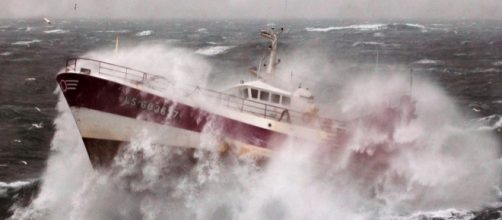A group of angry New England fishermen is suing the Trump administration over his predecessor’s creation of a massive 5,000-square-mile East Coast monument. Created by President Obama last September, the Northeast Canyons and Seamounts Marine National monument was called one of the largest abuses of government overreach using the Antiquities Act. Now designated, the area is off-limits to energy exploration, development, and fishing.
Environmentalists were overjoyed since they wanted this monument for years. It was the second marine monument after Obama expanded the Papahānaumokuākea Marine National Monument in early Sept last year.
The trawling ban started 90 days after Obama signed the executive action, forcing fisherman to travel even further, which has increased fuel usage and carbon dioxide emissions.
Obama Takes Over Another Large Swath Of Ocean And Local Fisherman Are LIVID https://t.co/nsBHW4rZOq pic.twitter.com/8wRUvsM83Z
— The Daily Caller (@DailyCaller) September 15, 2016
Economic disaster
Most experts don’t think the Trump administration will fight this Lawsuit in court giving the fishermen a de facto win, yet the administration has so far refused to comment on its strategy. The coalition of fishermen said the monument would kill commercial trawling and ravage fishing towns along the New England coast. Lobster and red crab fishermen have seven years to move their fisheries, while commercial fishers had until mid-December to leave the monument area.
The lawsuit said this new designation—the size of Connecticut—sets most fishing sites off limits, and “what remains of fishing opportunities [would] be phased out over the next few years.” It noted the “illegal, unilateral” designation threatens to cause “economic distress for individuals.” Experts speculate it will cost the industry $50 million a year. Families and local communities that rely on New England’s fishing industry are already feeling the effects.
Fishermen sue Trump over monument Obama created
— Ben Owen, HRK (@hrkbenowen) March 8, 2017
https://t.co/quDaH0x7nv
Environmental defense
The lawsuit was filed on behalf of three New England fishing associations and joined by numerous other organizations.
Before Obama rolled out this new monument, his administration said they engaged with the same groups now suing Trump. But the statement that accompanied the monument’s executive action doesn’t say whether they had garnered any support.
The lawsuit argues there was no reasonable environmental defense given for creating the massive marine monument on the edge of Georges Bank. One reason is that oil tankers can still cross the monument and telecommunications companies can still lay cable on protected seafloors. Jonathan Wood, the attorney representing the fishermen, said the lawsuit was also about reining in a president’s ability to use the Antiquities Act to write new legislation.
THR: Rep. Bishop blasts Obama's marine monument https://t.co/Mrghzh9SrN (WASHEX)
— HWDRepublican (@HWDRepublican) August 26, 2016
More than any president
Obama, Wood said, used the Antiquities Act more than any other president and “including vastly more area within his designations” than his predecessors. He said the rarely used act was not a blank check that gave a president carte blanche. Lawmakers concurred in a separate letter to the president, arguing the monument was a “clear example of federal overreach and regulatory duplication.”
Rep. Bob Bishop (R-Ut.) and Delegate Aumua Amata Coleman Radewagen (R-American Samoa) asked the president to “reverse this travesty,” which was already harming the fishing industry and causing widespread economic hardship.
The lawmakers said the fishing industry provides a valuable contribution that serves “healthy, well-managed fish” to all Americans. Bishop has been an opponent of these unilateral decisions that have cost jobs and hurt the economy.

